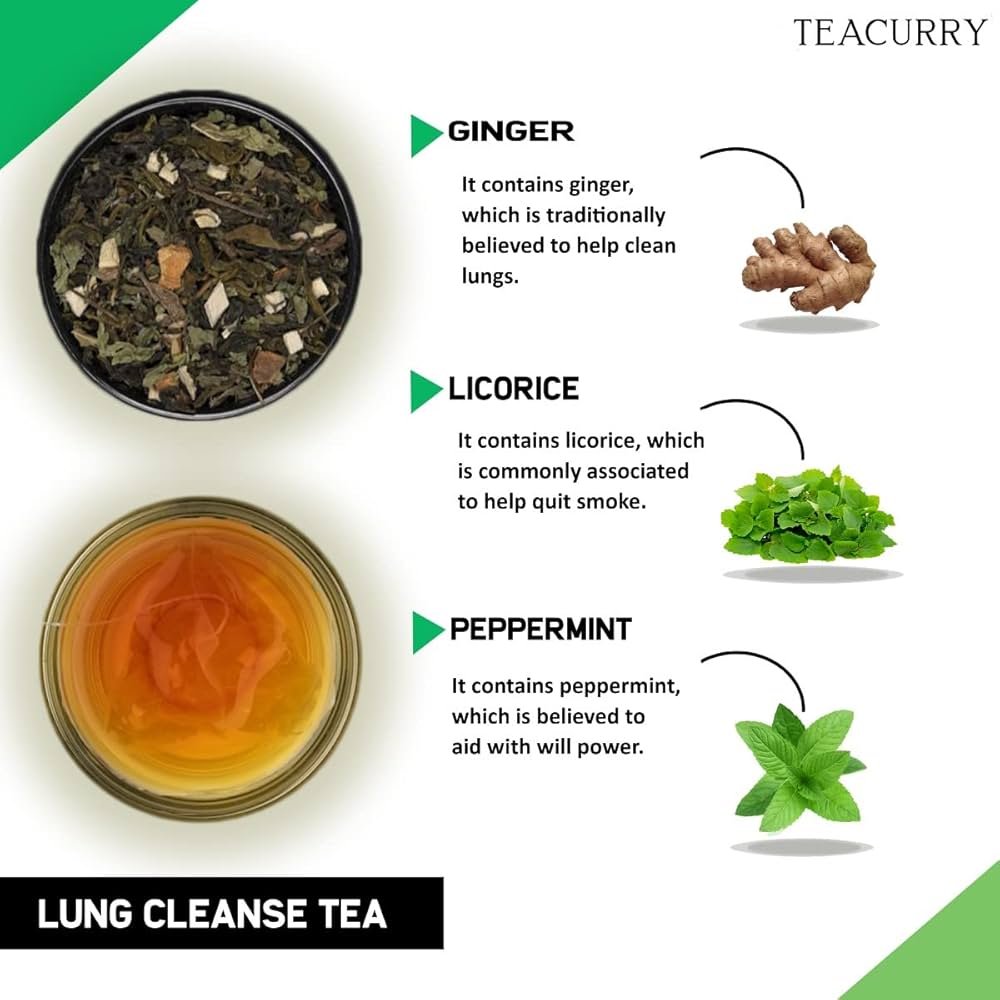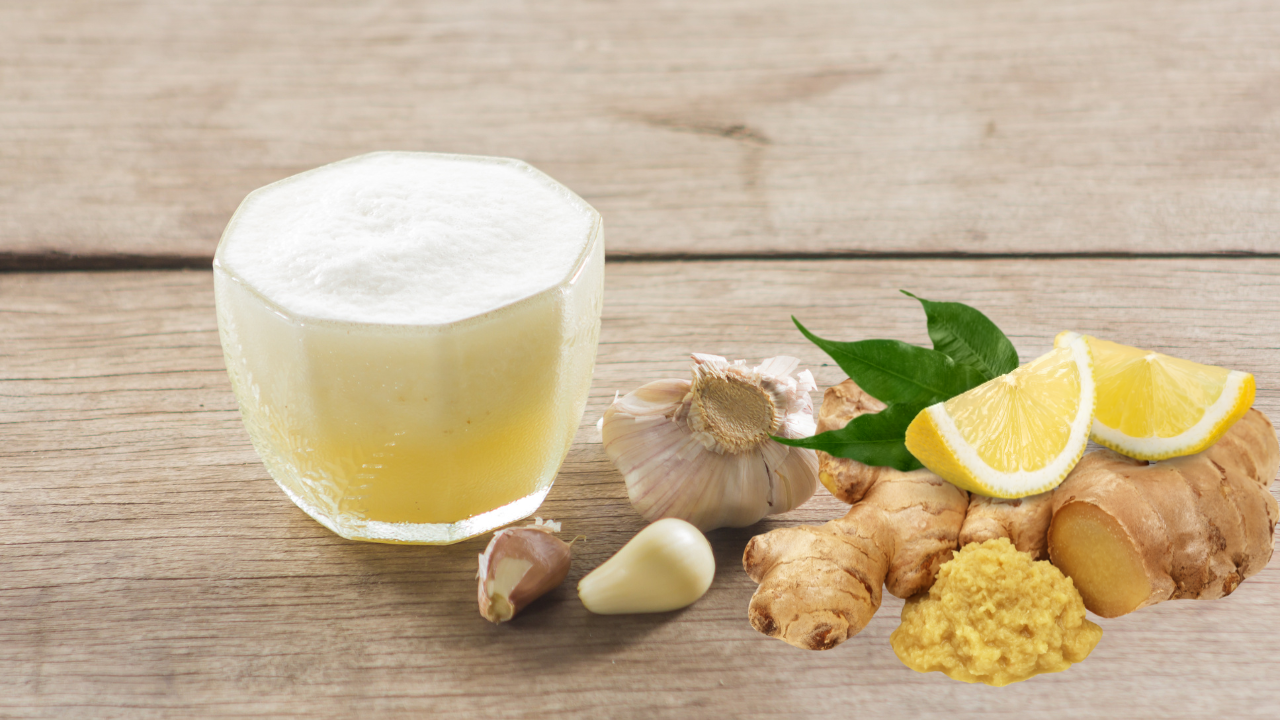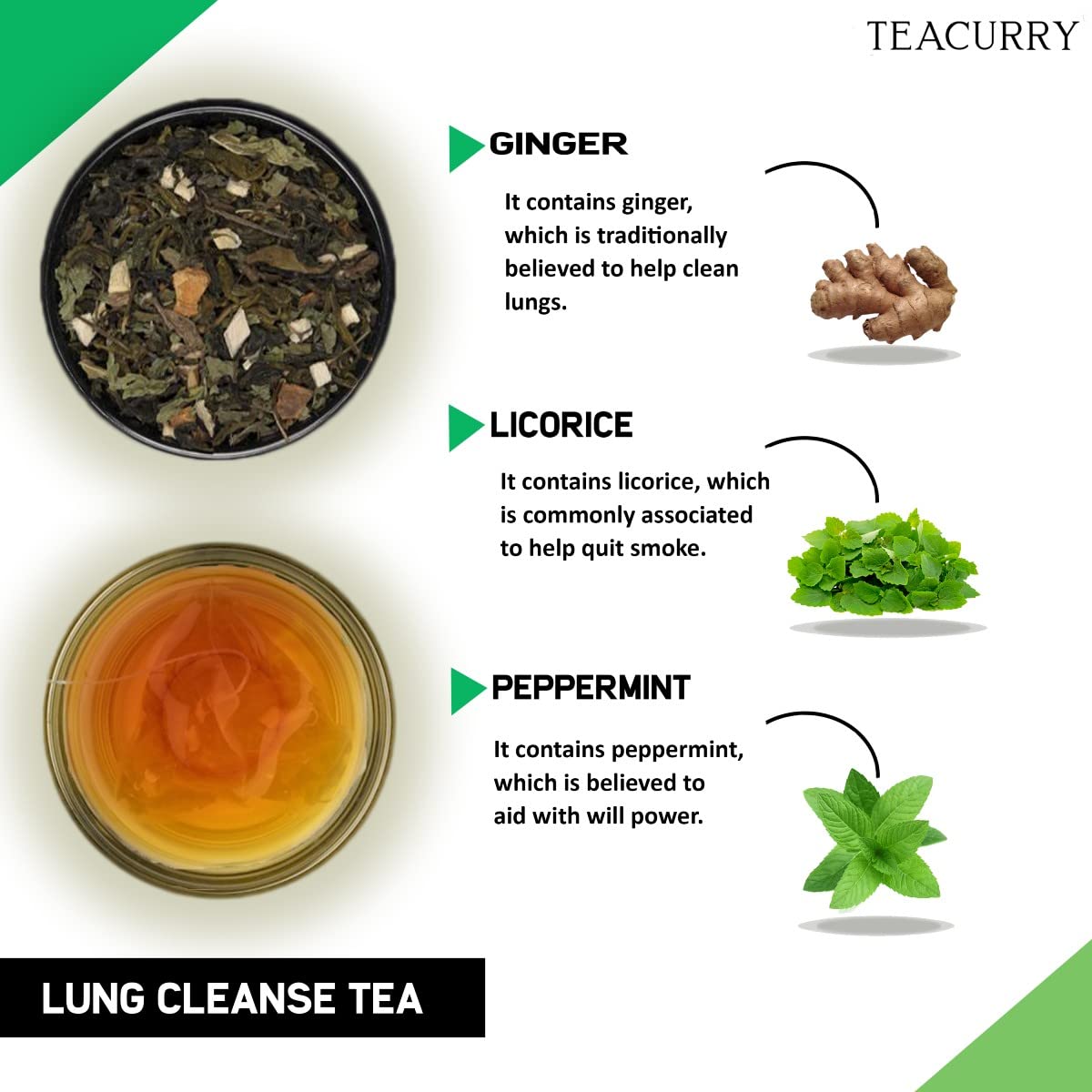Does ginger clean your lungs

Ginger, a culinary and medicinal herb, has been widely used for centuries to alleviate various ailments. Its distinct flavor and aroma have made it a staple ingredient in many cuisines worldwide. Beyond its culinary uses, ginger also possesses remarkable medicinal properties, including anti-inflammatory, antioxidant, and antimicrobial effects. Recent research suggests that ginger may have potential benefits for respiratory health, particularly in the context of lung cleansing. This article delves into the question: does ginger clean your lungs? We will explore the scientific evidence and potential mechanisms underlying ginger's purported lung-cleansing abilities, shedding light on its potential role in promoting respiratory health.
Does Ginger Clean Your Lungs? A Closer Look
The short answer is: no, ginger does not directly clean your lungs in the way that, say, a cleaning agent cleans a surface. There's no scientific evidence to support the claim that ginger can physically remove mucus or other substances from your lungs. However, ginger does possess certain properties that can indirectly support lung health and alleviate some respiratory symptoms. It's important to distinguish between cleaning your lungs (a physical process) and supporting overall respiratory health (a more nuanced concept).
Ginger's Anti-inflammatory Properties
Ginger contains compounds like gingerol and shogaol, known for their potent anti-inflammatory effects. Chronic inflammation can contribute to respiratory issues like asthma and bronchitis. By reducing inflammation in the body, ginger may help manage these conditions and ease associated symptoms like coughing and shortness of breath. However, it's not a cure, and shouldn't replace prescribed medication.
Ginger and Immune Support
Ginger has been traditionally used to boost the immune system. A stronger immune system is better equipped to fight off infections that can affect the lungs, such as the common cold or influenza. While ginger won't directly "clean" the lungs, a robust immune response can help prevent or mitigate respiratory infections.
Ginger as an Expectorant?
Some people claim ginger acts as an expectorant, helping to loosen and remove mucus from the respiratory tract. While anecdotal evidence exists, scientific research on this specific claim is limited. While ginger might help to thin mucus slightly through its water content and potential irritant effects (causing increased production of mucus that can then be more easily expelled), it's not a guaranteed or highly effective expectorant compared to established medications.
Ginger's Role in Reducing Coughing
The anti-inflammatory and potential expectorant effects of ginger may contribute to a reduction in coughing. A persistent cough can be irritating and exhausting, particularly for those with lung conditions. Ginger might offer some relief, but again, it's not a replacement for prescribed cough suppressants or treatments for underlying respiratory illnesses.
Important Considerations and Cautions
While ginger can offer some supportive benefits for respiratory health, it is crucial not to rely on it solely for treating lung conditions. If you have any respiratory problems, consult a doctor or respiratory therapist for proper diagnosis and treatment. They can help determine the underlying cause of your symptoms and recommend appropriate medical interventions. Ginger can interact with certain medications, so it's vital to discuss its use with your healthcare provider, especially if you are on any other medications.
| Ginger's Potential Benefit | Mechanism of Action (Possible) | Scientific Evidence |
|---|---|---|
| Reduces inflammation | Gingerol and shogaol | Moderate |
| Supports immune function | Various bioactive compounds | Moderate |
| May act as an expectorant | Thinning of mucus | Limited |
| May reduce coughing | Anti-inflammatory and expectorant effects | Limited |
Does Ginger Clean Your Lungs? A Closer Look
The short answer is: no, ginger does not directly clean your lungs in the way that, say, a cleaning agent cleans a surface. There's no scientific evidence to support the claim that ginger can physically remove mucus or other substances from your lungs. However, ginger does possess certain properties that can indirectly support lung health and alleviate some respiratory symptoms. It's important to distinguish between cleaning your lungs (a physical process) and supporting overall respiratory health (a more nuanced concept).
Ginger's Anti-inflammatory Properties
Ginger contains compounds like gingerol and shogaol, known for their potent anti-inflammatory effects. Chronic inflammation can contribute to respiratory issues like asthma and bronchitis. By reducing inflammation in the body, ginger may help manage these conditions and ease associated symptoms like coughing and shortness of breath. However, it's not a cure, and shouldn't replace prescribed medication.
Ginger and Immune Support
Ginger has been traditionally used to boost the immune system. A stronger immune system is better equipped to fight off infections that can affect the lungs, such as the common cold or influenza. While ginger won't directly "clean" the lungs, a robust immune response can help prevent or mitigate respiratory infections.
Ginger as an Expectorant?
Some people claim ginger acts as an expectorant, helping to loosen and remove mucus from the respiratory tract. While anecdotal evidence exists, scientific research on this specific claim is limited. While ginger might help to thin mucus slightly through its water content and potential irritant effects (causing increased production of mucus that can then be more easily expelled), it's not a guaranteed or highly effective expectorant compared to established medications.
Ginger's Role in Reducing Coughing
The anti-inflammatory and potential expectorant effects of ginger may contribute to a reduction in coughing. A persistent cough can be irritating and exhausting, particularly for those with lung conditions. Ginger might offer some relief, but again, it's not a replacement for prescribed cough suppressants or treatments for underlying respiratory illnesses.
Important Considerations and Cautions
While ginger can offer some supportive benefits for respiratory health, it is crucial not to rely on it solely for treating lung conditions. If you have any respiratory problems, consult a doctor or respiratory therapist for proper diagnosis and treatment. They can help determine the underlying cause of your symptoms and recommend appropriate medical interventions. Ginger can interact with certain medications, so it's vital to discuss its use with your healthcare provider, especially if you are on any other medications.
| Ginger's Potential Benefit | Mechanism of Action (Possible) | Scientific Evidence |
|---|---|---|
| Reduces inflammation | Gingerol and shogaol | Moderate |
| Supports immune function | Various bioactive compounds | Moderate |
| May act as an expectorant | Thinning of mucus | Limited |
| May reduce coughing | Anti-inflammatory and expectorant effects | Limited |
What is the best detox for the lungs?

There's no single "best" lung detox because the term itself is misleading. The lungs are remarkably efficient at cleansing themselves through natural processes like coughing and the mucociliary escalator (a system of cilia that sweeps mucus and trapped particles upward). Claims of "lung detox" products often lack scientific evidence and may even be harmful. Instead of focusing on detoxifying, it's far more effective to focus on preventing lung damage and supporting your body's natural cleansing mechanisms. This involves addressing underlying issues and adopting healthy lifestyle choices.
What are the natural ways to support lung health?
Supporting your lungs' natural cleansing processes is crucial. This is far more effective than any supposed "detox." Focusing on these methods improves lung function and reduces the burden of toxins and irritants.
- Hydration: Drinking plenty of water helps thin mucus, making it easier to cough up and clear from the lungs.
- Humidification: Using a humidifier, especially in dry climates or during winter, can also help thin mucus.
- Regular Exercise: Moderate exercise improves lung capacity and overall respiratory function. Avoid strenuous activity if you have underlying lung conditions.
Can diet help improve lung function?
Nutrition plays a vital role in overall health, including lung health. A balanced diet rich in certain nutrients can support the immune system and protect against lung damage.
- Antioxidants: Foods rich in vitamins A, C, and E, as well as beta-carotene, have antioxidant properties that can combat oxidative stress and inflammation in the lungs.
- Fruits and Vegetables: These provide essential vitamins, minerals, and fiber, contributing to overall well-being.
- Omega-3 Fatty Acids: Found in fatty fish, flaxseeds, and walnuts, these fatty acids have anti-inflammatory effects that can benefit lung health.
What about quitting smoking?
Quitting smoking is the single most effective thing you can do to improve your lung health. Smoking is the leading cause of preventable lung disease. Once you quit, your body begins to repair itself.
- Seek support: Utilize resources like nicotine replacement therapy, support groups, or counseling to aid in quitting.
- Address triggers: Identify situations or emotions that trigger your smoking habit and develop coping mechanisms.
- Stay committed: Quitting is a process, and setbacks may occur. Don't give up; stay committed to your goal.
What are the risks associated with so-called lung detox products?
Many products marketed as "lung detox" lack scientific backing and may contain harmful ingredients. Some may contain ingredients that can irritate the lungs or have other adverse effects. It’s crucial to avoid these products and prioritize proven methods for improving lung health.
- Lack of regulation: Many detox products are not subject to rigorous testing and regulation.
- Potential for harm: Some ingredients may cause allergic reactions or other adverse effects.
- False promises: These products often make exaggerated claims that are not supported by scientific evidence.
When should I see a doctor about my lungs?
If you're experiencing persistent coughing, shortness of breath, wheezing, chest pain, or other respiratory symptoms, it's vital to seek medical attention. A doctor can accurately diagnose any underlying lung conditions and recommend appropriate treatment.
- Early diagnosis: Early detection and treatment of lung diseases is crucial for better outcomes.
- Personalized care: A doctor can create a personalized plan based on your specific needs and health status.
- Access to treatments: Your doctor can prescribe medications or recommend other treatments, if necessary.
Does ginger clear mucus?

Whether ginger clears mucus is a complex question without a definitive yes or no answer. While ginger doesn't directly break down mucus, its properties may offer indirect relief from mucus buildup. It possesses anti-inflammatory and expectorant properties. The anti-inflammatory action can help reduce inflammation in the respiratory passages, potentially making it easier to clear existing mucus. The expectorant effect may help to loosen and thin the mucus, making it easier to cough up. However, it's crucial to understand that ginger is not a cure for mucus buildup and shouldn't replace medical advice or treatment for underlying conditions.
Ginger's Anti-inflammatory Properties and Mucus
Ginger contains bioactive compounds like gingerols and shogaols, known for their potent anti-inflammatory effects. Inflammation in the respiratory tract can contribute to mucus production and congestion. By reducing this inflammation, ginger may indirectly help alleviate symptoms associated with mucus build-up. This isn't a direct removal of mucus, but rather a reduction in the factors that contribute to its excess production. It's important to note that this effect is likely to be most noticeable in cases where inflammation plays a significant role in mucus production.
- Reduces inflammation in the airways.
- May decrease the production of excess mucus.
- Offers symptomatic relief, not a cure.
Ginger as an Expectorant
Ginger's expectorant properties can help to loosen and thin the mucus in the respiratory tract. This makes it easier to cough up the mucus and clear the airways. This effect is due to its ability to stimulate the production of saliva and other fluids, helping to dilute the mucus. However, the effectiveness of ginger as an expectorant can vary from person to person, and it may not be effective for everyone. It's best used in conjunction with other supportive measures rather than as a standalone treatment.
- Helps thin and loosen mucus.
- Stimulates the production of fluids that help to dilute mucus.
- May make it easier to cough up mucus.
Limitations of Ginger in Mucus Clearance
It's crucial to understand that ginger is not a miracle cure for mucus. Its effects are primarily supportive and may not be sufficient for severe cases of mucus buildup or underlying respiratory conditions. Ginger should not be relied upon as the sole treatment for conditions causing significant mucus production, such as bronchitis or sinusitis. Medical advice should always be sought for persistent or severe symptoms.
- Not effective for all types of mucus.
- Not a substitute for medical treatment.
- Effectiveness varies greatly between individuals.
When to Use Ginger for Mucus Relief
Ginger may offer some relief from mild mucus build-up associated with minor respiratory irritations or common colds. It can be used as a complementary therapy alongside other self-care measures like hydration and rest. It is best suited for mild, temporary discomfort rather than chronic or severe conditions. Always consult a doctor if symptoms persist or worsen.
- Mild respiratory irritation.
- Common cold symptoms.
- As a supportive therapy, not a primary treatment.
Potential Side Effects of Ginger
While generally safe for most people, ginger can cause side effects in some individuals. These can include heartburn, indigestion, and diarrhea, particularly when consumed in large quantities. Individuals with bleeding disorders or those taking blood-thinning medications should exercise caution when using ginger. Always consult a healthcare professional before using ginger to treat any medical condition, especially if you have pre-existing health concerns or are taking other medications.
- Heartburn.
- Indigestion.
- Diarrhea (in large quantities).
What can I drink to clear my lungs?

There is no magic drink that will instantly "clear" your lungs. Lung congestion and mucus buildup are often symptoms of underlying conditions like colds, the flu, bronchitis, or even allergies. While certain drinks can help thin mucus and soothe irritated airways, they are not a cure and should be used in conjunction with other treatments recommended by a medical professional. Self-treating can be dangerous, and it's crucial to consult a doctor if you experience persistent lung issues.
Liquids to Hydrate and Thin Mucus
Staying well-hydrated is crucial for breaking up mucus. Water is the best choice, but other fluids can help too. The goal is to increase the amount of fluid your body produces, helping to loosen and thin the mucus in your lungs. This makes it easier to cough up the phlegm and clear your airways.
- Water: Drink plenty of it throughout the day.
- Herbal Teas: Chamomile, ginger, and licorice root teas can have soothing properties.
- Broth: Warm broths, especially chicken soup, can help hydrate and soothe irritated throats.
The Role of Warm Liquids
Warm liquids, in general, can provide comfort and help loosen congestion. The warmth can help to relax the airways and make it easier to breathe. However, the temperature itself doesn't directly clear your lungs; it's the hydration aspect that is most beneficial. Avoid extremely hot liquids to prevent burns.
- Warm water with lemon and honey
- Warm milk (with honey, if tolerated)
- Herbal tea with honey (avoid if allergic to honey)
Drinks to Avoid
Certain beverages can worsen lung congestion or irritate the airways. It's essential to avoid anything that dehydrates you, such as excessive caffeine or alcohol. These substances can also interfere with sleep, which is crucial for recovery.
- Caffeinated beverages: Coffee, tea (in excess), soda.
- Alcohol: It is dehydrating and can worsen inflammation.
- Sugary drinks: These can increase inflammation and hinder recovery.
The Importance of Humidification
In addition to drinking plenty of fluids, increasing the humidity in the air can also help loosen mucus. Dry air can exacerbate lung irritation and make it harder to breathe. A humidifier or simply placing a bowl of water near a heat source can increase moisture in the air.
- Use a humidifier in your bedroom at night.
- Take a hot shower to increase the humidity in the bathroom.
- Place bowls of water near heating vents.
When to Seek Medical Attention
While home remedies can offer some relief, it is crucial to seek medical advice if your lung congestion persists or worsens. Persistent coughing, shortness of breath, chest pain, or fever are all signs that you should consult a doctor immediately. They can properly diagnose the underlying cause of your symptoms and recommend the most appropriate treatment plan.
- Seek immediate medical attention for severe symptoms
- Consult a doctor for persistent lung issues
- Follow your doctor's recommendations for treatment
How to remove fluid in lungs naturally?

There's no single "natural" method guaranteed to remove fluid from the lungs (pleural effusion or pulmonary edema). Fluid buildup in the lungs is a serious symptom indicating an underlying medical condition, such as heart failure, pneumonia, or kidney disease. Attempting to treat this at home without professional medical advice can be dangerous and potentially life-threatening. Always consult a doctor for diagnosis and treatment. However, some lifestyle changes and home remedies mayhelp support treatment plans prescribed by a physician and alleviate some symptoms, but they should never replace professional medical care.
1. Elevating the Head and Chest
Elevating your head and chest can help gravity assist in draining fluid from your lungs. This simple measure can provide some comfort and might help improve breathing. It's crucial to consult your doctor about the best position and duration for elevation as it depends on the underlying cause of the fluid buildup.
- Use extra pillows to raise your head and chest while sleeping.
- Sit upright in a chair for extended periods when awake.
- Avoid lying flat on your back.
2. Managing Underlying Conditions
Addressing the root cause of the fluid buildup is paramount. If heart failure is the cause, diligently managing it through medication and lifestyle changes is essential. Proper management of underlying conditions is the key to reducing fluid retention. If the condition is caused by kidney issues, working with a nephrologist to regulate kidney function is critical.
- Follow your doctor’s prescribed medication regimen precisely.
- Maintain a healthy diet and lifestyle as recommended by your doctor.
- Attend all scheduled medical appointments for monitoring and adjustments to treatment.
3. Dietary Adjustments
A balanced diet can play a supporting role. Reducing sodium intake is crucial as it contributes to fluid retention. Focus on a diet rich in fruits, vegetables, and whole grains. Certain herbs and foods are claimed to have diuretic properties, but their effectiveness in treating lung fluid is not scientifically established and should not replace medical treatment.
- Limit your sodium intake significantly.
- Increase your consumption of potassium-rich foods (bananas, spinach).
- Consume a diet high in fruits and vegetables.
4. Herbal Remedies (Use with Extreme Caution)
Some herbal remedies, like dandelion root or ginger, are traditionally used as diuretics. However, these should only be considered with explicit approval and guidance from your doctor. They can interact with other medications or worsen underlying conditions. Self-treating with herbal remedies could be extremely risky.
- Do not use any herbal remedies without consulting your doctor.
- Discuss potential interactions with your current medications.
- Be aware that many herbal remedies lack rigorous scientific backing for their efficacy.
5. Breathing Exercises
Deep breathing exercises might help improve lung function and alleviate some discomfort. Techniques like diaphragmatic breathing can help expand the lungs and potentially aid in fluid drainage. This should not be considered a primary treatment method but can be a supplementary measure with your doctor's approval.
- Practice diaphragmatic breathing regularly.
- Consider guided breathing exercises or consult a respiratory therapist for proper technique.
- Combine breathing exercises with other prescribed medical interventions, not as a replacement.
Does ginger actually clean your lungs?
While ginger is known for its anti-inflammatory and antioxidant properties, it's crucial to understand that it doesn't directly "clean" your lungs in the way a cleaning solution might clean a surface. Your lungs have their own natural mechanisms for removing mucus and other substances through coughing and the movement of cilia (tiny hair-like structures). Ginger may indirectly support these processes by reducing inflammation and potentially easing respiratory symptoms associated with conditions like bronchitis or asthma. However, it's not a substitute for medical treatment. Claims suggesting ginger can magically cleanse your lungs are often misleading and overstated. The purported lung-cleansing effects of ginger are largely based on anecdotal evidence and not substantial scientific research. If you're experiencing respiratory problems, it's vital to consult a doctor for a proper diagnosis and treatment plan, rather than relying solely on ginger. While including ginger in a healthy diet might offer general health benefits, it shouldn't be considered a primary method for lung detoxification or cleaning.
Can ginger tea help with lung congestion?
Ginger tea, thanks to its anti-inflammatory properties, might provide some relief from lung congestion. The warmth of the tea can soothe irritated airways, and the ginger itself may help to reduce inflammation in the respiratory tract. However, it's essential to remember that this effect is likely mild and not a cure-all for lung congestion. If you have severe or persistent lung congestion, seeking medical attention is paramount. Ginger tea might help to ease minor congestion, making it easier to breathe, particularly when combined with rest and hydration. But, it's not a replacement for prescribed medications or other medical treatments, especially for chronic conditions. Think of ginger tea as a potential complementary therapy, offering some comfort, but not a primary solution for significant lung congestion issues. It's best used alongside other proven methods like proper hydration and rest.
Are there any scientific studies proving ginger's lung-cleansing effects?
Currently, there is limited scientific evidence directly supporting the claim that ginger cleanses the lungs. While research shows ginger possesses beneficial properties such as anti-inflammatory and antioxidant effects, these effects are not specifically targeted at the lungs in a manner that would equate to "cleaning". Many purported benefits are based on traditional medicine and anecdotal evidence, which, while potentially valuable, require rigorous scientific scrutiny before acceptance. Studies focusing on ginger's impact on respiratory health often concentrate on its role in easing symptoms of specific conditions, such as reducing inflammation associated with bronchitis, rather than explicitly stating that it “cleans” the lungs. More robust clinical trials are needed to fully understand ginger's potential influence on lung health. To rely solely on ginger for respiratory ailments without seeking proper medical attention is risky and potentially harmful.
What are the potential side effects of using ginger for lung issues?
While generally considered safe for consumption, ginger can have potential side effects, especially when consumed in large quantities or if you have pre-existing health conditions. Some individuals might experience gastrointestinal discomfort, such as heartburn, indigestion, or diarrhea. In rare cases, ginger may interact with certain medications, such as blood thinners. If you have a bleeding disorder or are taking blood-thinning medication, consult your doctor before incorporating significant amounts of ginger into your diet. Allergic reactions, though uncommon, are also possible. For lung-related issues, it's always best to consult with a healthcare professional before relying on ginger as a primary treatment. Self-treating serious respiratory problems could have serious consequences, delaying proper medical care. While ginger might offer minor supportive benefits, it shouldn't replace a proper medical diagnosis and treatment plan.
Deja una respuesta